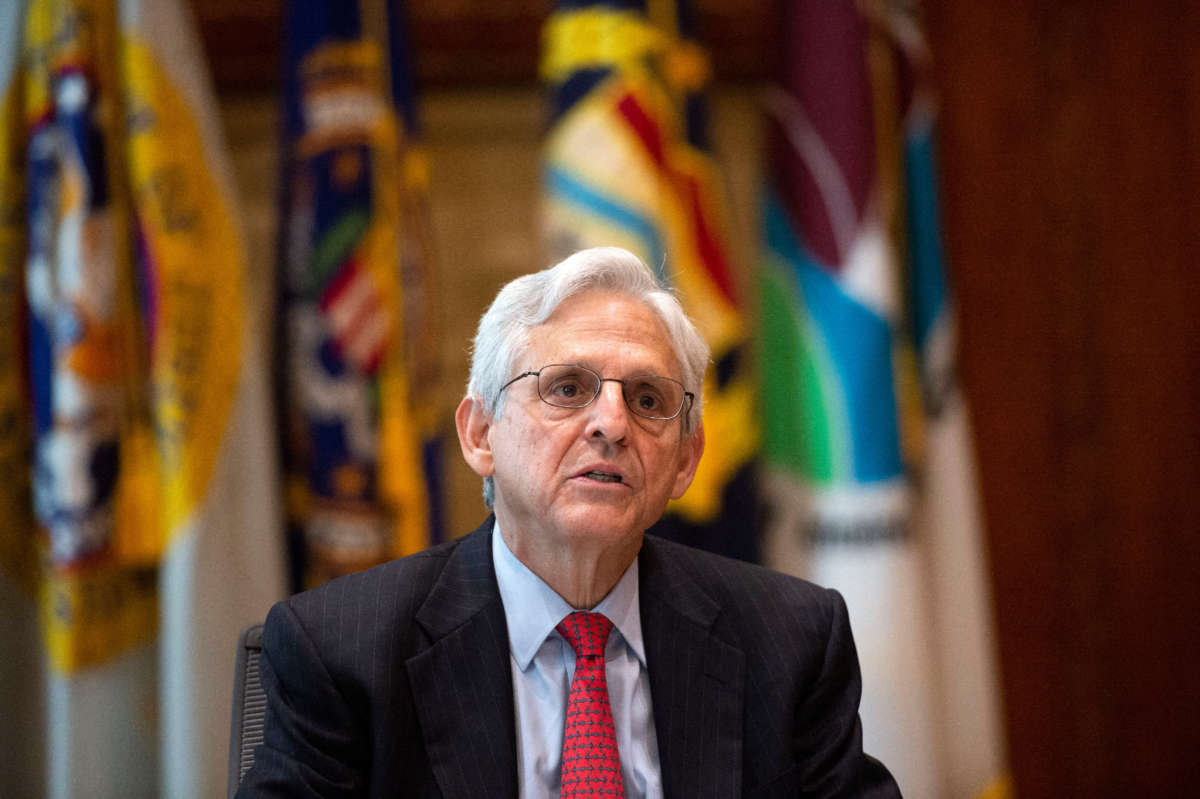Truthout is a vital news source and a living history of political struggle. If you think our work is valuable, support us with a donation of any size.
A Department of Justice (DOJ) memo approved by Attorney General Merrick Garland extends a policy, which originated under the Trump administration, on how the department can investigate political candidates, potentially giving the former president added protection from federal inquiries as he considers another run for office.
The memo, which was first reported on by MSNBC host Rachel Maddow, demands that investigators receive written permission from the attorney general before opening inquiries into individuals running for president or vice president, or into senior members involved in their political campaigns. It also limits what DOJ officials can say or how they can proceed in an investigation of such persons.
The memo, which was written in May of this year, reiterates policy that was implemented by former Attorney General William Barr, who served under former President Donald Trump. At the time, many viewed Barr’s memo, crafted in February 2020, as being in response to Trump’s continued anger toward inquiries involving him or his underlings, and how those investigations could paint a negative portrayal of him during that year’s presidential race. Many decried the policy as it would allow individuals like Trump and those connected to him a “free pass” from investigations during an election year, or for as long as Trump remained a political figure and not a private citizen.
It’s not unusual for U.S. attorneys general to urge caution during elections, but Barr was reportedly the first to require investigators to obtain his permission before opening any inquiries into individuals running for president or vice president, or those involved in their campaigns.
Within his memo, Garland, who faces steep criticism for not doing more to investigate or indict Trump for the former president’s past misdeeds, seeks to continue the policy started by Barr.
“The Department of Justice has a strong interest in the prosecution of election-related crimes, such as those involving federal and state campaign finance laws, federal patronage laws, and corruption of the election process,” the memo states. “As Department employees, however, we must be particularly sensitive to safeguarding the Department’s reputation for fairness, neutrality, and non-partisanship.”
Just like Barr, Garland requires investigators who believe they may even face “the appearance of an issue” regarding the timing of statements or steps they take in inquiries to “contact the Public Integrity Section of the Criminal Division (“PIN”) for further guidance.” Any new investigation must be signed off by Garland, the memo says, citing the guidance created by Barr in 2020.
The memo doesn’t preclude investigations from happening against political figures. However, it slows the process down, and requires more steps that many view as unnecessary to opening inquiries against individuals investigators believe may have committed a crime.
The policy could play a huge role in any inquiries that DOJ officials may open (or have already opened) against Trump, especially if he decides sooner rather than later to announce his candidacy for president in 2024. Trump is reportedly considering doing so as soon as this fall, in part because he believes it will stave off potential investigations or indictments against him.
Critics warned that the continuation of Barr’s policy will do no good for the country, as it will allow Trump and others to avoid being held accountable for their actions, particularly those relating to the January 6, 2021, attack on the U.S. Capitol.
“If Merrick Garland hides behind the institutional concern about not appearing partisan and lets Trump slip away by declaring himself a presidential candidate, he will do serious harm to rule of law and the principle no one is above the law,” said journalist Steven Beschloss.
Daily Beast columnist Wajahat Ali agreed that the memo created the strong potential for Trump to face no repercussions for his involvement in the Capitol attack, or his attempts to overturn the 2020 presidential election.
“As predicted, nothing will happen to Trump and his associates, traitors who tried to overthrow our democracy. They’ll all fail up,” Ali tweeted. “Why? To protect ‘institutions’ that have long since failed the American people.”
“It is profoundly unlikely that there will be any indictments of Trump or anyone related to his campaign before the midterms, and if Trump declares for 2024 in the coming weeks, as he has indicated he plans to do, the likelihood that he will be indicted or prosecuted before the next presidential election is slim to none,” Elizabeth McLaughlin, CEO of Gaia Project for Women’s Leadership, wrote in her newsletter. “And that, of course, will mean there will be no accountability at all.”
Holding Trump accountable for his illegal war on Iran
The devastating American and Israeli attacks have killed hundreds of Iranians, and the death toll continues to rise.
As independent media, what we do next matters a lot. It’s up to us to report the truth, demand accountability, and reckon with the consequences of U.S. militarism at this cataclysmic historical moment.
Trump may be an authoritarian, but he is not entirely invulnerable, nor are the elected officials who have given him pass after pass. We cannot let him believe for a second longer that he can get away with something this wildly illegal or recklessly dangerous without accountability.
We ask for your support as we carry out our media resistance to unchecked militarism. Please make a tax-deductible one-time or monthly donation to Truthout.
